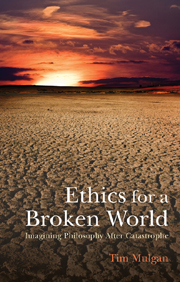Book contents
- Frontmatter
- Contents
- Acknowledgements
- Preface: Imagining a broken world
- Introductory lecture: Philosophy in the age of affluence
- Part I Rights
- Lecture 1 Nozick on rights
- Lecture 2 Self-ownership
- Lecture 3 The Lockean proviso
- Lecture 4 Nozick in a broken world
- Lecture 5 Nationalism
- Part II Utilitarianism
- Part III The social contract
- Part IV Democracy
- Reading list
- Bibliography
- Index
Lecture 1 - Nozick on rights
from Part I - Rights
- Frontmatter
- Contents
- Acknowledgements
- Preface: Imagining a broken world
- Introductory lecture: Philosophy in the age of affluence
- Part I Rights
- Lecture 1 Nozick on rights
- Lecture 2 Self-ownership
- Lecture 3 The Lockean proviso
- Lecture 4 Nozick in a broken world
- Lecture 5 Nationalism
- Part II Utilitarianism
- Part III The social contract
- Part IV Democracy
- Reading list
- Bibliography
- Index
Summary
Introducing Nozick
Robert Nozick was a late-affluent academic philosopher, who spent his entire career at one institution of learning. His Anarchy, State, and Utopia is one of the few affluent works to survive intact. Nozick's topic was rights. His approach was called libertarianism, because it emphasized freedom. (A quite different view of freedom was liberal egalitarianism, our topic in Part III.)
Affluent people were obsessed with rights. They claimed rights to do and say things, rights over their bodies and life choices, rights over external things, and rights against one another. Almost any dispute in affluent society was eventually expressed in the language of rights. This persistent rights-talk raises many quesi ons. Who (or what) has rights? What is a right? What rights are there? What is the function of rights? Where do rights come from? What makes something a right, rather than a moral claim of some other sort? How do we know what rights there are?
Nozick was perhaps the staunchest affluent defender of rights. He represents, in an exaggerated form, the preoccupations and presuppositions of his age. Nozick began with a decepi vely simple claim:
Individuals have rights, and there are things no person or group may do to them (without violai ng their rights). So strong and far reaching are these rights that they raise the question of what, if anything, the state and its officials may do. How much room do individual rights leave for the state?
(Nozick, Anarchy, State, and Utopia, ix)- Type
- Chapter
- Information
- Ethics for a Broken WorldImagining Philosophy after Catastrophe, pp. 18 - 31Publisher: Acumen PublishingPrint publication year: 2011



